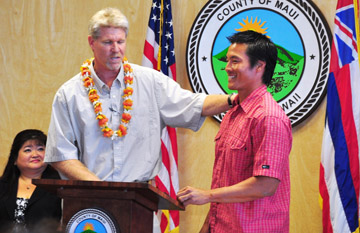Wednesday, February 17th, 2010
.JPG)
In the wake of an economic downfall, the Kalaupapa community is taking action to voice its concern over the services and programs adversely affected by state budget cuts.
Recently, the patient residents of Kalaupapa have felt the repercussions of the state-imposed cuts, which have ultimately contributed to the reduction of staff members, lower quality of services, and a decrease in store, gas station and administrative office hours.
In an effort to shed light on these circumstances, the patients are planning to write personalized letters detailing their ongoing concerns to the state government ? though it won't be the first time.
.JPG)
food and supplies." Complaints of the patients' care home being downgraded, administrative and business services being greatly decreased and the possibility of downsizing the food service staff ? meaning no more hot meals or home meal delivery on weekends ? were also detailed in the letter.
Under the Hawaii Revised Statute 326, the "State may not reduce services to leprosy patients to point of imperiling life or imposing severe hardship without pretermination hearing."
But in a response letter on Jan. 13, Gov. Lingle assured patients the state remained committed to providing them with lifetime services and health care, and noted that the Kalaupapa budget "will not sustain reductions that would endanger the health and safety of the residents."
Kalaupapa Department of Health (DOH) administrator Mark Miller said in a community meeting last Wednesday that the message perceived by Gov. Lingle’s letter was for the patients to "tough it out” during these “tough times.”
Miller said ultimately the state controls the budget and if change is to occur, both the governor and congressmen need to hear the individual voices of the patient residents themselves.
Although Gov. Lingle cleared up rumors regarding downsizing the kitchen staff (there are no plans to make cuts, nor to eliminate weekend meals) and closing the Hansen's Disease Branch and Kalaupapa Admistration (neither are said to be true), the residents still find the state not upholding its obligation to adequately sustain services, and requires further action.
Drafting letters that discuss patients' current conditions and personal hardships is one option being explored as the settlement continues to fight for its well being, determined not to be pushed aside or forgotten about.
Kalaupapa Memorial Update The vision of a memorial honoring over 8,000 Hansen’s disease patients that have been sent to Kalaupapa is inching closer to reality as the options for locations have been narrowed down to the old Baldwin home and Judd Park. Eighty percent of the former patients do not have grave markings.
Erica Viernes-Stein, a National Park Service (NPS) archeologist, is conducting an archaeological information investigation and surveys of the sites that will determine the material present on the surface and below ground, as well as any absence of material.
The reports gathered from the NPS are then submitted to the National Environment Policy Act (NEPA) who will then make an environmental assessment based on cultural, historical and environmental significance.
At this stage, the process is a collaborative effort by the NPS and Ka ‘Ohana O Kalaupapa ? a non-profit established to preserve the history and spirit of the Kalaupapa patients ? who’s opinion on the location will be heavily weighed.
.jpg)
.jpg)







.JPG)
.JPG)


_0.jpg)
_0.jpg)
.JPG)
.JPG)
.jpg)
.jpg)





